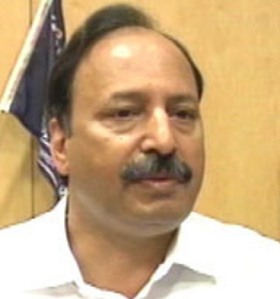Front outfits
SIMI operate under various fronts to avoid law enforcement agencies after it was banned in 2001. Some of these outfits include:
- Khair-e-Ummat Trust,
- Popular Front of India,
- Tahreek-e-Ahyaa-e-Ummat (TEU),
- Tehreek-Talaba-e-Arabia (TTA),
- Tahrik Tahaffuz-e-Sha´air-e-Islam (TTSI)
- Wahdat-e-Islami [18]
Kerala
SIMI conducted training camps in the southern Indian state of Kerala. [19]
Binanipuram camp
A camp was organised in 2006 at Binanipuram near Aluva in Ernakulam district of Kerala state. 40-50 SIMI members were trained in commando and jungle warfare skills. [20]
On 15 August 2006, Kerala police questioned 18 people and arrested five — Ansar Moulavi, Shaduli, Nizamuddin, Abdul Rafeeq and Shamas — under the Unlawful Activities (Prevention) Act. The five arrested were later released on bail.
Ansar Moulavi and Shaduli are also accused of attending another training camp at Vagamon conducted between December 2007 - January 2008. Both were arrested after the 13 May 2008 Jaipur bombings by the Rajasthan police. [21]
Vagamon camp
A camp was conducted at Thangalpara, Vagamon in Idukki district of Kerala in December 2007-January 2008. Camp attendees are said to be trained in commando, jungle warfare, trekking, rock climbing, rappeling and herbal medicine. Speeches inciting the participants to wage jihad (war) against India are said to be made. [22]
About 20 students from Hubli, Belgaum and Bangalore were trained to assemble explosives with easily available materials by a bomb expert Abdul Subhan Qureshi. Ammonium nitrate, a commonly available nitrogenous fertiliser, was used in the 2008 Ahmedabad bombings. Prototypes of liquid bombs using commonly available hydrogen peroxide were first experimented at the Vagamon camp. [20]
Abdul Sathar alias Manzoor, from Aluva in Kerala, is accused of attending the camp and of being involved in the 2008 Ahmedabad bombings and 2008 Bangalore serial blasts. [23] He is also accused of recruitment of youths from Kerala and sending them to Pakistan for terror training by the Lashkar-e-Taiba. [24] Declared a proclaimed offender, an Interpol red alert notice was issued against him. A fugitive for six years, he was deported from Dubai on 2 August 2013 and arrested on arrival in India. [22]
Kannur camp
On 23 April 2013, a terror training camp inside a building owned by Thanal Foundation Trust [25] in Mayyil Narath area of Kannur district was organised by members of Popular Front of India (PFI), a SIMI front. [26] The camp was raided by police and 21 people were arrested. Country bombs, a sword, a human effigy, cellphones and accessories for making bombs were recovered during the police raid. [27]
According to the charge sheet filed by the investigators, activists belonging to Popular Front of India and its political wing Social Democratic Party of India had organised this training camp. The charge sheet said that one of the participants had links with Indian Mujahideen terrorist group. The investigators provided evidence of transfer of funds between bank accounts to prove its allegations. The bank accounts details of Sanaulla Shabandri were found during the raid on the house of one of the accused. Shabandri from Bhatkal, is believed to be a close associate of Yasin Bhatkal and an Indian Mujahideen member. [27]
On 21 January 2016, a court sentenced 21 of those accused to varying years of imprisonments after they were found guilty under several charges including criminal conspiracy, membership of unlawful assembly, possession of arms and explosive substances, inciting communal disharmony, assertions prejudicial to national integration besides organising a terrorist camp. [28]
The court found that the enterprise was unlawful and that the accused persons could not explain why they were in possession of weapons and country-bombs. [29]
Karnataka
Castle Rock camp
In April 2007, SIMI held a terrorist training camp at Castle Rock near Hubli, under the cover of hosting an outdoors event. [30]
Gujarat
Pavagadh camp
In January 2008, a training camp at an isolated place near the Khundpir (also spelt Khundmeer) dargah [31] near Pavagadh in Gujarat state was reportedly used to train SIMI activists for the 2008 bomb attacks on the cities of Ahmedabad and Surat. [32] [33] [34] [35]






